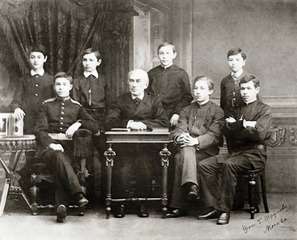|
Back
Etudes ‘n’ Stories, Rach ‘n’ Roll New York
BargeMusic
08/11/2018 -
Ludwig van Beethoven: Piano Sonata No. 26 in E-flat Major “Les Adieux”, Opus 81a
Alexander Scriabin: Etudes: F-sharp Major, Opus 42, No. 1; F-sharp minor, Opus 12, No. 2; C-sharp minor, Opus 2, No. 1; D-sharp minor, Opus 12, No. 12
Sergei Rachmaninoff: Etudes-tableaux: A minor, Opus 39, No. 6; E-flat minor, Opus 33 No. 3; G minor, Opus 33 No. 5; E-flat Major, Opus 33 No. 4
Leonard Bernstein: Four Movements from West Side Story (Arranged by Leo Smit)
Franz Liszt: Transcendental Etude No. 10 in E minor
Olga Vinokur (Pianist) 
O. Vinokur at BargeMusic (© Samuel A .Dog)
“Etude? Brutal!”
William Shakespeare, Act III, Scene I, Julius Ceasar (Variation)
The BargeMusic recitals by Russian-American pianist Olga Vinokur are both unpredictable and inevitable. To say the least, her selections are eclectic, far-seeing, heterogeneous, for her tastes are singularly vast. On the other hand, whatever her choices, Ms. Vinokur’s recitals are wisely structured–even if these structures are open to interpretation.
Last night, her theme might have been “etudes”, since three-fifths of the program were devoted to the most difficult studies by three composers. Or her theme might have been contrasts between two contemporary Russian composers since they were the centerpiecess of her work. Or possibly, she was offering the chances for our mental imagery to do the work. Half the music told a story, half seemed to jostle our imaginations into pictures which the composers might have unconsciously offered.
The most important element is that Ms. Vinokur doesn’t need to show off her volatile performance. Those fingers speak for themselves. Those very brutal etudes, by three of the greatest pianists in history, were not child’s play, as we might hear from Ax or Hamelin. They were tough and they sounded tough. Yet those difficulties were Augean challenges, and her accomplishment was well worth the efforts.
The recital began with a rare piano story by Beethoven. (No, he never called that other sonata “Moonlight”.) It was the same story as Bach’s story of bidding farewell to a friend. But Beethoven’s Les Adieux was emotionally more poignant. And that was how Ms. Vinokur played the bookend movements.
In fact, the first three notes–over which Beethoven scrawled “Farewell”– were played with utmost pathos. One wanted her to continue with her story, even the allegro sections packed with the mundane emotions one seldom associates with Mr. B. And if her second movement seemed like an intermission, that final joyous “return” with the exaggerated movement direction Vivacissimamente was played with an almost naive happiness.
Again, one hates to inject an image into the music, but the rhythms, the jolting jumping performance of Ms. Vinokur summoned up–please don’t laugh–the giddy greeting my dog gives me upon returning.

Moscow Conservatory: A. Scriabin (second from left), S.Rachmaninoff (fourth from right)
The following two composers took their manias in different directions. Separated by one year in birth, joined by an adoration which Sergei Rachmaninoff felt for Alexander Scriabin, both composers took different routes in emotion and music. Scriabin challenged his demons with drink and drugs, his music evolving from Chopin dreaminess to mystical euphoria and an early death. Rachmaninoff had his own demons. He employed less romantic but more efficacious therapy to garner a longer and relatively happier life.
Ms. Vinokur played Scriabin’s popular C-sharp Minor etude (which he wrote at the age of 14), skirting the more mystical works, giving a civilized picture of the composer. Some might have wanted a more clarified buildup of notes, others might have wanted more ferocity. The clouds of tonalities, the strange changes of keys were satisfactory enough.
For the Rachmaninoff Opus 33, Ms. Vinokur needed no religiosity, no Tantric allusions. These four works (including one from Opus 39) were pure beauty. And obviously the music of one who never let a finger linger when it could be playing a note. Needless to say, Ms. Vinokur took care of the fingering, and allowed the music to carry itself.
That she carried the fierce Opus 33, No. 7 Etude while the Barge was listing from side to side was a good example of “Rach ‘n’ Roll.”
The penultimate work was new to me, though Bernstein’s West Side Story melodies are amongst the most popular ever written. Leo Smit was born in America, studied in Russia (under Kabelevsky) and returned here, dying at the age of 78 in 1999.
His quartet from Bernstein (Jets, Jump Cha-Cha and Cool) was less an transcription than a fiercely difficult arrangement. I had heard Ms. Vinokur do a splendid Gershwin-Wild arrangement previously, and, like so many younger Russian composers in America, she had it down with intuitive plaudits.
Here, she took the usual knocks on piano, snappings of fingers easily. But in taking Leo Smit’s quodlibet for Cool–playing two or three totally different melodies together–she gave a terrific idea of her own great artistry.
The final Liszt Tenth Transcendental Etude gave one more example of her power. This, with a Chopin encore, was the epitome of Olga Vinokur’s prowess. In a bit more than an hour, she had surveyed a pianistic panorama, offering the audience a variegated picture of prowess and vision.
Harry Rolnick
|